

PeopleCert Accredited Training Organisation
ITIL V4 Certification | ITIL Certification Course
ITIL® Foundation Certification With ITIL4 Training
Master ITIL® 4 Certification & Advance Your ITSM Career with Expert-Led Training
5K+ Enrolled
Accredited by
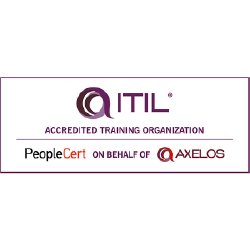
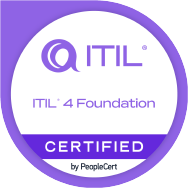
Accredited by


PeopleCert Accredited Training Organisation
ITIL V4 Certification | ITIL Certification Course
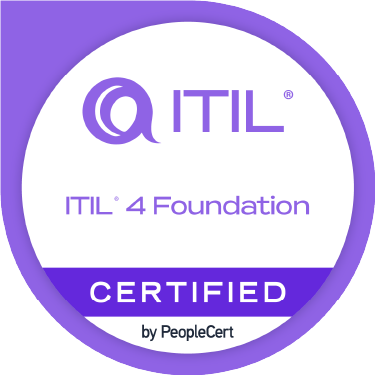
5.0
5K+ Enrolled
Master ITIL® 4 Certification & Advance Your ITSM Career with Expert-Led Training
Accredited by



Guaranteed to Run Workshops

Expert-Led Study Sessions

Networking Opportunities

Flexible Monthly Payment Plans

Real-World Case Studies

Hands-On Project Experience
Request More Details
450K+
Professionals trained
250+
Workshops every month
30+
Trainers
450K+
Professionals trained
250+
Workshops every month
20+
Trainers
Course Overview
ITIL 4 Foundation Certification Training empowers professionals to deliver unique IT Services. This ITIL Foundation course online is based on values, cost, & risk management in the IT Service management. This comprehensive program instils the skills necessary for IT teams to collaborate effectively, employing a common language and robust tools from the latest ITIL 4 framework. Explore core concepts and the ITIL® 4 service value system through dynamic learning processes.
Our ITIL foundation certification offers a comprehensive grasp of the core principles, elements, and methodologies of ITIL 4. This framework empowers businesses to establish a robust foundation for designing, building, and executing effective strategies. It also plays a key role in ensuring compliance and driving significant improvements. Pursuing ITIL 4 certification is a critical step for professionals aiming to elevate their skills in IT service management and advance their careers. With our program, you'll be equipped to enhance a service organization's capability, confidence, and operational readiness.
Also, know the benefits of ITIL foundation certification
Simpliaxis is the perfect platform to validate your expertise in implementing ITIL principles and concepts to enhance business value. This ITIL foundation v4 certification is the first step towards gaining more advanced ITIL certification and confidently growing your ITSM career.
Check out: Tips & Tricks to Crack ITIL Foundation Exam

ITIL 4 Foundation Training Highlights
16-Hours of Live Instructor-Led Sessions
Earn 16 CPDs on Course Completion
Get an online subscription to ITIL publications
Exam fees are included in the Training cost
Earn eBook, and PeopleCert Training Material
Practice Mock Tests & Assessment for the exam
24/7 Simpliaxis support & assistance

Career upliftment

Simpliaxis' ITIL® Foundation Certification training will help people become future-ready to work with cross-functional teams.

Unsure about your prep?

Benefits focused on Individuals and corporate
Common attendees
IT Managers
IT Practitioners
IT Project Managers
IT Professionals
Business Process Owner
IT Support Staff
Business Managers
Business Analyst
Anyone searching for higher-level ITIL certifications
Professionals transitioning from ITIL® 3 to ITIL® 4

Prerequisites for ITIL 4 Foundation certification training
The ITIL 4 Foundation certification is designed for a wide range of individuals who want to gain a solid understanding of ITIL and IT service management concepts.
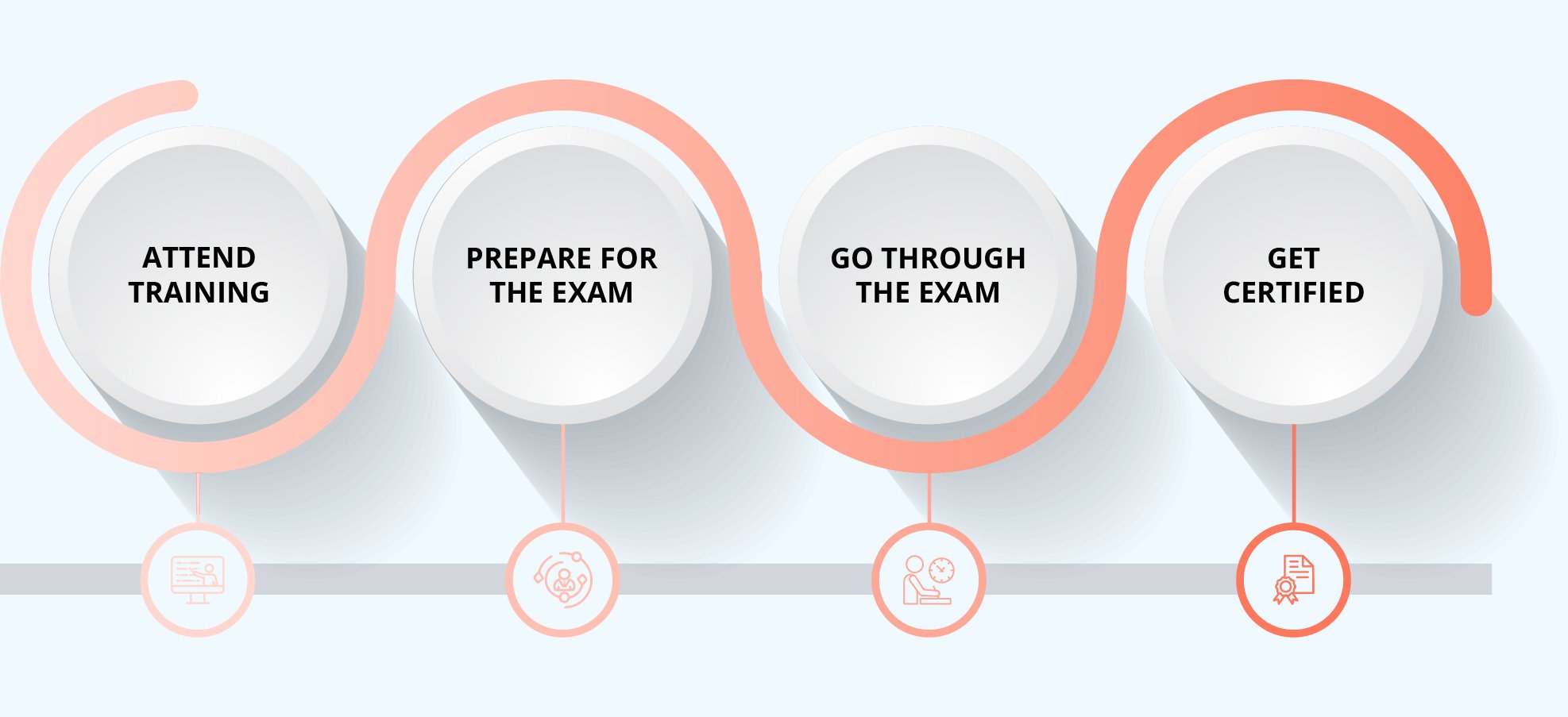
Step 1:
Attend ITIL Foundation Training: Enroll in the Simpliaxis instructor-led online ITIL 4® Foundation training course.
Step 2:
Prepare for the Exam: Study the materials thoroughly, paying attention to the fundamental concepts, which are provided by our Simpliaxis expert instructor in ITIL® 4 framework.
Step 3:
Go Through the Exam: Once you feel confident in your Knowledge, take the ITIL 4® Foundation exam. Simpliaxis will help you to clear the exam perfectly.
Step 4:
Achieve ITIL®4 Certification: Upon completing the exam with a minimum score of 65%, you will officially become ITIL4 certified.

Get the ITIL 4 Foundation Certification
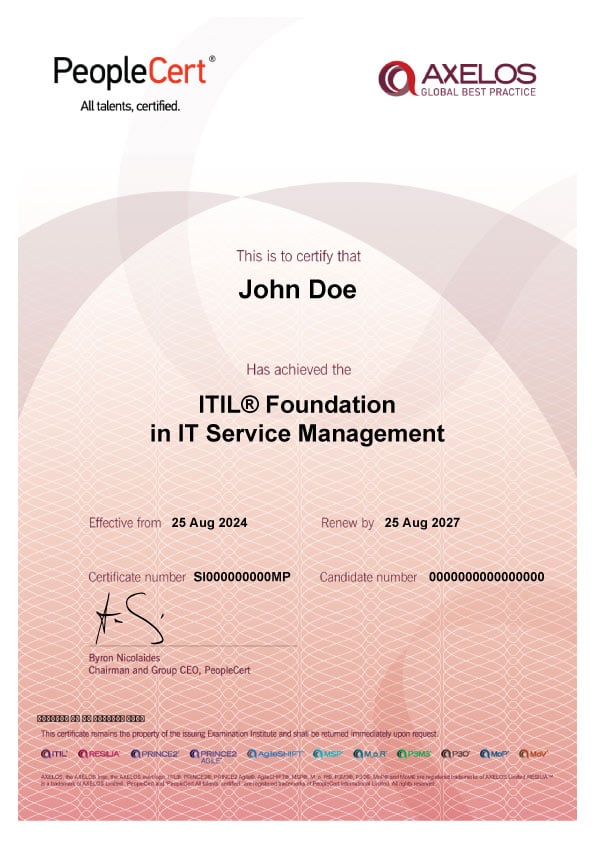
Curriculum
Course Curriculum
What you will learn in this ITIL 4 Foundation workshop
ITIL Essential Concepts:
Grab the fundamental principles and concepts that form the basis of the ITIL framework.
ITSM Processes and Components:
Understand the key components and processes that form the foundation of IT service management.
IT Service Alignment with Business:
Discover how to effectively align IT services with business goals and customer requirements.
IT Service Delivery Best Practices:
Learn about the most effective practices in the industry to ensure efficient and effective delivery of IT services.
Stages of the ITIL Service Lifecycle:
Gain a deeper understanding of the various phases of the ITIL service lifecycle and their importance.
Roles and responsibilities:
comprehend the different roles and duties involved in an IT service management framework.

40+ Certification programs made an impact
Employee retention improved by 45%
Work satisfaction and capabilities improved by 30% on an average
100+
Clients













ITIL 4 Foundation Certification Course For Corporates
With learning targeted to your unique team environment, we at SimpliAxis help to resolve your specific issues and meet your specific needs with tailored training methods. We offer corporate training globally to keep Organizations up to date by building the knowledge gap required and make them strive in the competitive world with the right skills according to the industry needs.

Our Customer words for us
Meet the Team That's Invested in Your Success
What is an ITIL® Foundation certification?
Who is eligible for ITIL 4 Foundation certification?
How do I get ITIL Foundation certification?
How many hours is the ITIL certification course?
Who will issue ITIL certification?
What next after the ITIL 4 foundation?
Is the ITIL Foundation certification worth it?
Does ITIL certification expire?
How to renew ITIL Foundation certification?
What ITIL certification paths are available in the ITIL framework?
Where can I get practice test questions for ITIL certification?
What is the cost of the ITIL 4 Foundation exam?
What is the exam format for the ITIL 4 Foundation exam?
What is the Passing Score for the Foundation exam?
Do you have any prerequisites for the ITIL 4 Foundation certification exam?
How can I get access to the ITIL 4 Foundation exam?
What is the retake cost for the ITIL Foundation exam?
What happens to my token or partial payment if I don’t enroll immediately?
Is there a preferred currency for payment, especially for international students?
Can payments be made online through your website, or do I need to visit a physical location?
Do you offer any discounts or promotions for early payment?
Can I pay for the course in installments, or is full payment required upfront?
Will I get a refund if I cancel my enrollment?
Where will I get my payment receipt?
Is there any transaction or processing fee?
What cards do you accept?
What payment options are available?
What if I miss a class? Are there any money back options?
If I want to know more about Training, whom should I connect with?
Is there any option to complete the Training in the native language if a participant chooses to?
Can I receive personalized Training at my convenience?
Where do I find the upcoming schedules of my course?
After enrollment, can I change the date of my training class?
Do I get any certificate upon completion of the course?
How do I enroll in the training course?
What are the different courses offered by Simpliaxis?
What are the different modes of Training available for Simpliaxis courses?
Do you offer online Training?
Do you offer corporate Training?
Who are the instructors of my course?
Is there any discount available for the Simpliaxis courses?
Whom do I contact if I have more queries regarding my course?
Are your courses affordable?
Why should I choose Simpliaxis?
What is the object of Simpliaxis?
How much discount will I get if I enroll for the Training?
ITIL 4 Foundation Course FAQs
To get ITIL Foundation Certification, you need to go through step by step process-
Step 1: Get trained: Enroll for an upcoming ITIL®4 Foundation training through Simpliaxis - a Certified partner and an Accredited Training Organization (ATO) of PeopleCert. You'll attend a 16-hour training session to sharpen your knowledge.
Step 2: Take the exam: You'll receive the exam preparation material to take the online ITIL® Foundation exam. The exam is a 60-minute, closed-book test, and you must score a minimum of 65% to pass.
Step 3: Receive the certificate: Once you pass the exam, you'll receive the ITIL® Foundation certificate. With this certification, you'll become a leader in your ITSM team!
You can reach out to our experienced career counselor
or email us on support@simpliaxis.com
or contact any of our phone numbers
or you can chat with us anytime
or visit our contact us page https://www.simpliaxis.com/contact-us
Find out why 1,000+ professionals love SimpliAxis
Global Recognition
Every Course is recognized by the most reputable certification organizations globally that ensure credibility and acceptance in all industries.
Expert Trainer
Gain knowledge from trained and experienced trainers who impart real-world business insights as well as practical experience to the classes.
Flexible Learning
Provides a variety of methods of learning, such as classes, online, and corporate Training, that meet the needs of different individuals and their schedules.
Lifetime Access
Enjoy all-year access to the recordings of sessions, course materials, and study tools.
Proven Track Record
A reputable training provider with impressive experience in helping professional and business organizations improve their abilities and meet their career ambitions.
End-to-End Assistance
Simpliaxis Offers ongoing assistance prior to, during, and after Training and includes study material exams, guidance for participants on certification, and career choices.
Interactive and engaging Training
Our Training sessions are designed to be extremely interactive, featuring real-world scenarios with group participation, questions & answers to aid in understanding.
A wide range of courses
Simpliaxis offers various internationally acknowledged certification courses in Agile, Scrum, SAFe, DevOps, Project Management, and more.

Courses based on location
Our privacy policy © 2018-2026, Simpliaxis Solutions Private Limited. All Rights Reserved